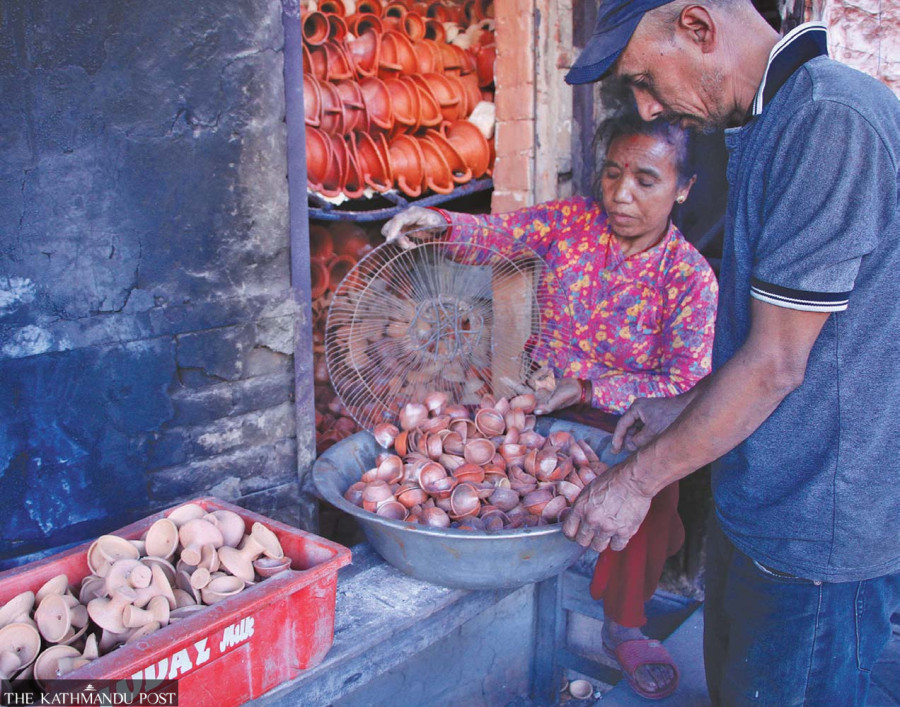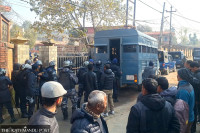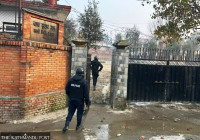Valley
Soil shortage, poor demand decimating Bhaktapur’s pottery-making
Prajapati community, who specialise in making earthenware, have asked the Bhaktapur Municipality to get them a place from where they can source clay, but are yet to get a response.
Anup Ojha
Just half a decade ago, a week before Tihar festival, the Prajapati family would be busy manufacturing palas—traditional earthen lamps—at the Pottery Square in Bhaktapur. But for the last few years, their traditional occupation has been in a crisis, compelling many families like the Prajapatis to quit the generations-old business and seek alternatives.
“The demand for palas has significantly come down and there is no profit in selling them,” said Maina Prajapati, 50, taking out a few pala and other mud-made utensils from a kiln.
“Earlier this kiln used to be filled only with palas, but now, there are very few to be baked. Previously, a large number of people would flock to buy them before Tihar, but not so these days,” lamented her husband Ram Prajapati.
The Prajapatis come from a long line of clay artisans who specialise in making earthenware, but many have left the profession due to shortage of clay and a decrease in the demand of palas. At the Pottery Square, there are some 150 Prajapati households, but hardly 40 people are now pursuing their traditional business.
Only a few in the new generation are in the trade. They too mostly cater to foreign tourists, demonstrating the art of making earthen pots on a wheel. They charge Rs150 to teach how to make a cup or any other earthenware.
“We stopped making palas this year, but we are making piggy banks, ceramic cups and other decorative materials from clay,” said Sitaram Prajapati, 42, who owns a ceramic shop in Pottery Square.
Old-timers recall how the open space around the Pottery Square would be filled with palas ahead of Tihar festival. But now, the area looks deserted. Close to it, a few Prajapati families are drying paddy in the sun as their ducks roam the open space.
“Usually, people who sell goods on the footpaths would order palas prior to Tihar,” Sitaram said. “But no one ordered this time as the Kathmandu Metropolitan City has prohibited them from selling goods on the footpaths.”
Maina and Sitaram, who have been in this business from their childhood, said their families would sell up to 400,000 pieces of palas during earlier Tihars, but now, it’s hard to sell even 20,000 pieces. None of their children are into the business.
“About 25 years ago, we used to sell a dozen palas for Rs15, now it is sold for Rs46 a dozen,” Maina said. “There is hardly any profit because the clay is expensive and hard to find.” She said the areas where they used to collect clay for making the earthen pots are now covered by houses and other structures.
Now it costs Rs 7,000 to bring mud in a mini-truck, but there is a shortage of black clay. Places like Harisaddhi in Lalitpur where the soil is found is already gentrified, covered as it is with concrete buildings.
Maina said easy availability of inexpensive Indian and Chinese electric lamps in the market is making people lose interest in buying locally made palas.
“Those who earlier used to order 300 palas now order only around half a dozen. They only take it to perform rituals, and even re-use them,” said Laxmi.
Upendra Suwal, the ward chair of Bhaktapur Municipality-4, said breakneck urbanisation and proliferation of brick kilns inside Kathmandu Valley have made black clay, a key ingredient in clay-pot making, scarce.
“The centuries-old pottery-making tradition of Bhaktapur is under threat,” Suwal said.
Although a group of Prajapati families have already submitted a memorandum to the Bhaktapur Municipality to preserve their occupation, they are yet to get a response, according to Krishna Sundar Prajapati, a local who is also an elected representative of ward-4 of the municipality.
“The main problem is soil,” Krishna said. “Because the lands are being plotted to be sold off, we need to pay extra money to contractors to buy soil. It used to be free just a decade ago.”
Krishna further said the Prajapati community in the Pottery Square have asked the Bhaktapur Municipality to give them a place from where they can source soil.
When the Post contacted Krishna Giri, chief administrative officer at Bhaktapur Municipality, to inquire about the declining profession of traditional pot makers, he said they are yet to decide on the issue.
“Our mayor [Sunil Prajapati] is also from the Prajapati community and there have been talks,” Giri said.
Giri, however, admitted that it would be tough to address the issue.
“The municipality can’t force the landowners to give pot makers soil,” he said. “For this, we should first find appropriate land.”




 20.12°C Kathmandu
20.12°C Kathmandu.jpg)












